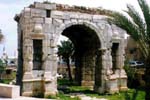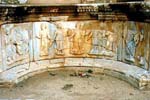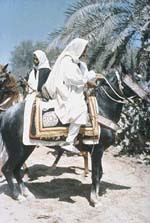|
History:
|
Most of the economic action in this part of the world has happened either to the East (Egypt), or to the West (Maghrib), of what is now Libya except for the role of the three Tripolitan cities as sea terminals for the trade with black Africa in antiquity and the discovery of huge oil and gas reserves in 1956. The temporary settlements put up by Phoenicians to trade with Berber tribes became Carthaginian colonies around 600 B.C. and important Roman trading cities after the fall of Carthage in 146 A.D. The commercial influence of Sabrata, Oea (Tripoli) and Leptis Magna extended as far as the Niger but the Vandal invasion of 435 destroyed the fortifications of Sabrata and Leptis Magna while sparing the smaller Oea. Their trade declined through miss-management and were of little importance when North Africa was invaded by a the Byzantine general Belisarius in 534. Only Oea survived to become Tripoli as Sabrata and Leptis Magna were abandoned after being razed during the Arab invasion of 643. Sand dunes covered much of their ruins and preserved them until they were excavated this century. During the following Arab period, all the action was west of here, mostly in Kairouan as Umayyad power was replaced by the Aghlabid's, the Fatimids' and the Hafsids' until Tripolitania fell to Spain in 1510 and later to the Ottoman Turks in 1551. The Turks ruled until 1770 when Karamanli, a chief of cavalry, seized power and established his own dynasty that lasted until the return of the Ottomans in 1835 who were chased out by the Italians in 1912.
|
|

Tripoli: Arch
İ2001: Bernard Cloutier
|

Sabrata
İ2002: Bernard Cloutier
|

İ2002: Africa Focus
|
|
The Italian period was short-lived and ended with Rommel's rear guard campaigns against the invading British. After WW II, the UN decided on the independence of Libya in 1949 and the pro-British Sidi (holy man) Idris of the Sanusi Brotherhood, was chosen to rule as King in 1951. Oil was discovered in 1959 and in 1969 a military coup led by nationalist Mouammar Qaddafi installed a socialist regime that removed British and American bases and expulsed Italian and Jews in 1970 and nationalized the oil industry 1973. Qaddafi went on to support a wide variety of revolutionary and terrorist movements in the world as if his mission were to isolate Libya from the international community. In 1993 the UN responded by imposing an air embargo that has been lifted in 2001 but a United States embargo is still in force.
Qaddafi :
To the Western establishment Mu`ammar Qadhafi is a 'madman' and the world's number one 'terrorist'. To many Arab Moslims and Africans he is a teacher, guide, brother, but above all, the leader of a world revolution for a New Civilisation. Born in the desert near the town of Sirte in 1942, Mu`ammar Qadhafi has been deeply influenced by his traditional upbringing. He has been described as a messenger and a thinker in the ancient North African tradition of the 'marabout' - a holy man. He lives simply, he does not drink, and he prays regularly. Although devout, he is a progressive Muslim in the tradition of the Prophet Muhammed. While most successful politicians are pragmatists before anything else, Qaddafi is one of these leaders who have bothered to write a book on their vision of the society they consider ideal. The Green Book is hugely successful because it caters to the prejudices of the audience it is aimed at. For example, it goes great lengths to demonstrate "scientifically" that a woman's place is in the kitchen or the nursery when she is not in the bedroom!
Enabling us to improve the quality of the content, if you have additonal information, remarks or suggestions, please share it with us by e-mail.
Traveler tips:
-
Shaking hands is very common whenever you meet someone strange or you already know, so do offer a warm hand shake whenever you meet any Libyan. That goes for men only. For women, only do so when she offers the handshake first and when you do make it a snappy and light one.
-
Do take off your shoes when you enter a Libyan house, no matter how long or how hard it is to do so. All shoes are left by the main entrance to the house and do not walk into the living room with your shoes on.
-
Talk back to people who approach you in the street, they are not after your money. Libyans are very friendly, and if they speak any English they will try to use it to welcome you to their community.
-
If you are offered a drink, do accept it even if you are not very keen. Such gesture is regarded more than just an offer of drink, but rather an offer of friendship, so do not reject it.
-
If you are invited into a Libyan's house for a meal, you may ask in advance for your meal to be mild rather than spicey, although most shouls realize that on their own. It's better to be safe than really sorry.
-
Do not stare at women or girls you meet on the street or in shops, Libyans may get offended by that, especially if they are accompanied by relatives or husbands.
-
Loud whistling, any Farting, spitting and burping (the noise one makes after a good meal) are to be avoided since these habits are considered as very rude by Libyans.
-
If you are entering a public office, shorts and T-Shirts are not allowed. Chewing gum is not preferred.
-
Drinking soft drinks while walking in the street is considered as rude. If you want to drink something then go to the nearest cafe. That goes for ice cream too. It's against the law to eat or drink on streets in Libya.
-
Long hair for men is not desirable and is considered as imitating females and is scorned upon by the traditional Libyans, less so by younger generations. Women should wear modest clothes and if possible cover the hair which will be regarded highly since that reflects respect for local traditions.
-
If you come into contact with older Libyans who might not speak any English, do say a few words in Arabic which will be appreciated and this can prompt providing help sought after from your guest.
-
Tourists are still a novelty to most Libyans and they would love to host them in their own houses to show hospitality. Under no circumstances should you offer a Libyan money for the help he offers you, it's highly offensive for them.
-
Kissing, Snogging, sitting on your partner's lap and any expression of affection in public is considered as having sex and a private thing that must be exercised at home. Such behavior in public will definitely result in somebody approaching you with harsh language to remind you that you are not doing the acceptable thing.
Last update: 24 April 2008
|